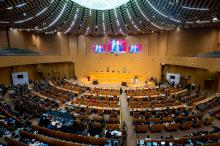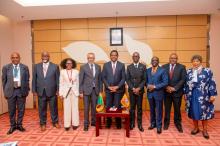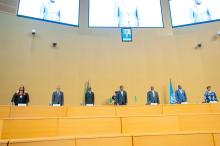RC75 Opening Ceremony: A moment of national and regional pride
The 75th session of the WHO Regional Committee for Africa (RC75) officially opened on 25 August with a high-level ceremony graced by His Excellency President Hakainde Hichilema, who welcomed delegates and reaffirmed Zambia’s commitment to health as a driver of economic development. In his keynote address, President Hichilema highlighted Zambia’s achievements, including allocating 12% of the national budget to health, recruiting 20,000 health workers, and expanding health infrastructure.
He also reaffirmed his role as the African Union and WHO Global Cholera Control Champion, pledging continued commitment to mobilize resources for cholera elimination. Notably, he announced plans to establish a cholera vaccine manufacturing plant in Zambia.
The President issued a powerful call for “unity, collaboration, and a commitment to humanity in making decisions that enhance health and well-being across Africa.”
In his address, Dr Tedros Adhanom Ghebreyesus, WHO Director-General, acknowledged Zambia’s progress in maternal health and urged delegates to seize opportunities presented through the challenges that the continent continues to face: “The challenges we face are significant and serious. But I prefer to see them as an opportunity for a healthier Africa, both for our continent and for our WHO. I urge you to seize this opportunity to chart a new future for our continent: a healthier, safer, fairer and more self-reliant future, free from the yoke of aid dependency.”
Dr Mohamed Yakub Janabi, WHO Regional Director for Africa, emphasized Africa’s readiness to lead its own health transformation: “Africa is ready not just to participate but to lead. This transformation will require more than WHO. Let us join hands in improving our people's health. We are building the same house — let us not fight for the bricks. We must lead the call for a global health architecture that is accountable, transparent, and responsive to African realities.”
Mahamoud Ali Youssouf, Chairperson of the African Union Commission, echoed the importance of health in Africa’s broader development agenda: “We recognize that health security, equity, and innovation are not stand-alone goals but are deeply integral to our broader pursuit of peace, economic growth, and continental integration.”
He praised the strong partnership between the African Union and WHO, calling it essential for achieving meaningful health outcomes and strengthening systems that serve all Africans.
Addressing the intersection of health and humanitarian crises, Dr Jean Kaseya, Director-General of Africa CDC, stressed the inseparability of peace and health: “Epidemics thrive in conflicts. We must work to integrate health into peace agreements. Peace without health is fragile, and health without peace is unsustainable.”
The RC75 served as a strategic platform to address pressing health challenges and endorse transformative policies. Delegates engaged in solution-oriented discussions on: Maternal and child health, malaria elimination, noncommunicable diseases, digital health transformation and health system resilience and emergency preparedness.
Speakers throughout the session emphasized the importance of regional sovereignty and solidarity, health diplomacy, and innovation. Zambia’s Minister of Health, Dr. Elijah Muchima, underscored the need for collaboration, stating that no country can tackle health challenges alone. His remarks echoed a shared commitment among Member States to work together in building resilient and equitable health systems across Africa.






